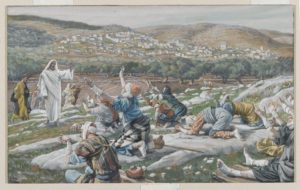Thoughts on Sunday’s Lessons for Oct. 13, 2019
First Reading (Track One): Jeremiah 29:1, 4-7
Whether our lives are going well or whether things are going badly, trust in God. Trust, and be thankful for God’s blessings. This is the theme that runs through Sunday’s readings.

Guérison de dix lépreux (The Healing of Ten Lepers), 1886-1894, opaque watercolor over graphite on gray wove paper by James Tissot (1836-1902). Brooklyn Museum. (Click image to enlarge.)
In Sunday’s Track One first reading, the Prophet Jeremiah, who in recent weeks we have heard weeping in anguish over the loss and destruction of Jerusalem and its temple, now dries his tears and, speaking on God’s behalf, gives practical advice to Judah in exile: Face your new reality. God has sent you here, so live, love and flourish as well as you can. Babylon is your city now, and you have a stake in its condition. But don’t forget God. Even in exile, don’t forget to pray.
First Reading (Track Two): 2 Kings 5:1-3, 7-15c
In Sunday’s Track Two first reading we meet Naaman, a proud commander of the Aramean army. Although he was a mighty warrior, Naaman had contracted leprosy, a disfiguring disease that in those days would have cost him not only his military rank but his high place in society. Although Aram was Israel’s enemy, Naaman took the advice of an Israelite maid to go to Israel and ask the Prophet Elisha to cure him. As it turned out, Elisha wouldn’t even see Naaman, but simply sent a servant to tell him to bathe in the Jordan, a measure that sounded too simple to be true. Naaman was beyond angry, but his servants urged him to try, and Naaman was cured; and through his cure he finds faith in Israel’s God.
Psalm (Track One): Psalm 66:1-11
Sunday’s Track One psalm at first appears to be in a familiar genre. a hymn of praise for God’s glory, power and awesome deeds. It describes God’s mighty works in the Exodus, leading the people out of Egypt, through the Red Sea and toward the Promised Land. But then it takes an unexpected turn: God not only leads us but tests us, too. We may groan under burdens, as Judah found in exile in Babylon. Even God’s own people may be conquered. They may suffer fire and flood. Yet after everything there is joy at the end, and praise.
Psalm (Track Two): Psalm 111
The Psalms, the hymnal of the ancient Temple, consist of many genres, from lament to complaint to petition to thanksgiving and praise. In Sunday’s Track Two psalm we hear a powerful song of praise and thanksgiving. We applaud God’s many acts of power and majesty, righteousness and justice; and at the end we sing our praise and gratitude for God’s gifts. All who practice wisdom have a good understanding of God, the psalm proclaims; all the wise are in awe of what God has done.
Second Reading: 2 Timothy 2:8-15
The young, growing Christian movement faced frightening persecution by the Romans when this letter was written near the end of the first century in the names of Paul and Timothy. These verses contain a strong call to faith. Recalling Paul’s suffering in chains in prison and facing death, the writer reminds us that God’s word cannot be held in chains. Remembering the death and resurrection of Jesus, we are reminded that, through we die with Jesus, we live in Christ.
Gospel: Luke 17:11-19
The Gospels give us a sense that Samaritans are bad, yet Jesus keeps showing us good Samaritans. The parable of the Good Samaritan who stops to help an injured stranger is one of the most beloved, but there’s also the story of Jesus talking with a Samaritan woman at the well in her village. Sunday’s Gospel shows us another: the single leper out of ten who comes back to thank Jesus for his healing is a Samaritan. While the other nine were healed, this one was saved. He not only became well, but Jesus opened for him the doors to the kingdom. In fascinating parallels with the story of Namaan in Sunday’s Track Two first reading, Jesus too cures the lepers at a distance, without touching them; and like Elisha, Jesus’ actions bring a despised foreigner to faith in God.
What are “Track 1” and “Track 2”?
During the long green season after Pentecost, there are two tracks (or strands) each week for Old Testament readings. Within each track, there is a Psalm chosen to accompany the particular lesson.
The Revised Common Lectionary allows us to make use of either of these tracks, but once a track has been selected, it should be followed through to the end of the Pentecost season, rather than jumping back and forth between the two strands.
For more information from LectionaryPage.net, click here.
Would you like to browse through more of our Illuminations?
Click this link to browse more than two full three-year cycles of these weekly Lectionary reflections, online in our Illuminations archive.
